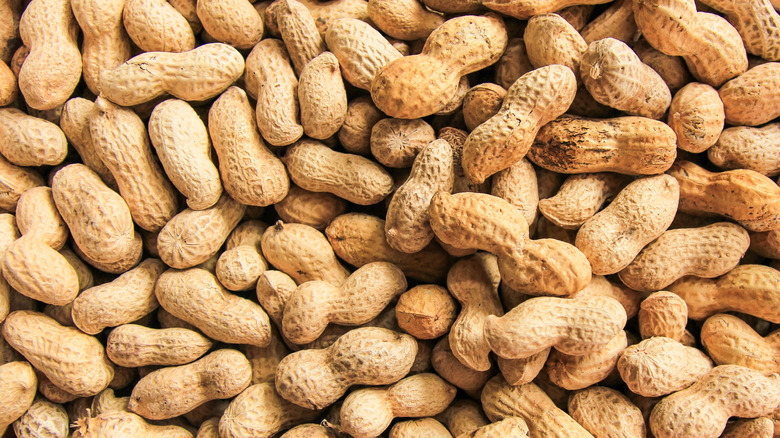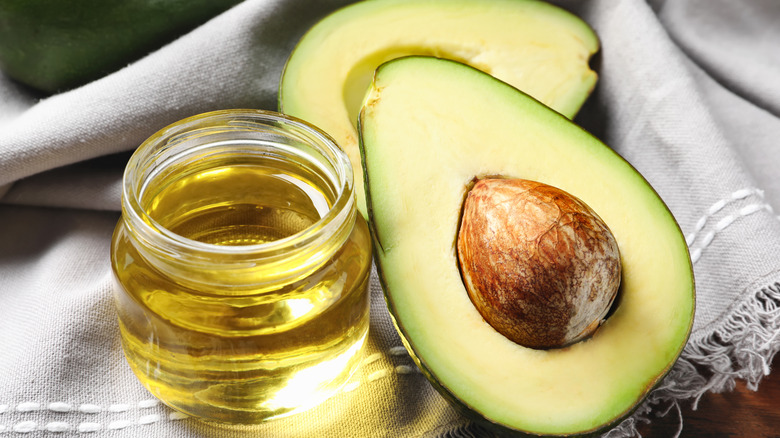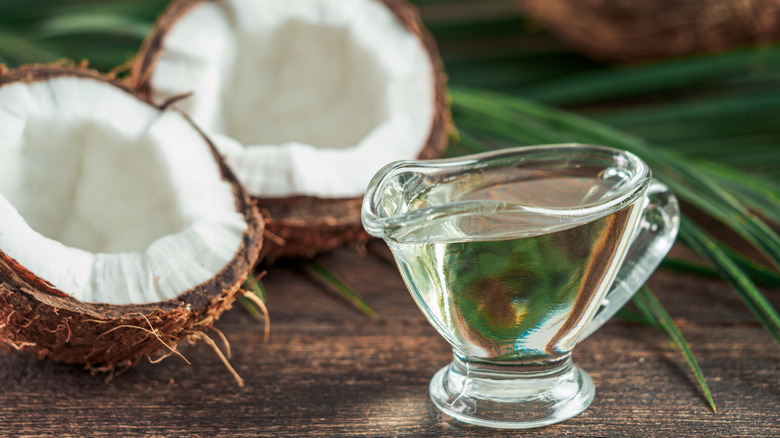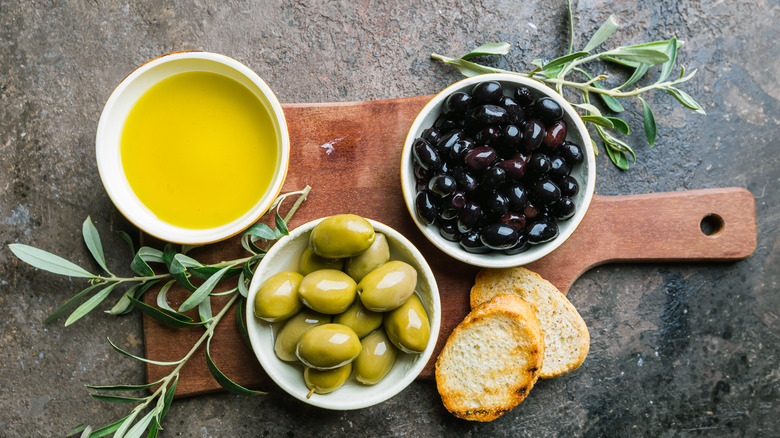10 Best Substitutes For Canola Oil
Many home cooks know that canola oil or some kind of neutral oil is a must-have pantry staple. But what they might not know is just what canola oil is made of or how it is best used. As it turns out, canola is actually an acronym: "Canadian oil, low acid," (via Small Footprint Family). Historically, canola oil was made from rape plants and was simply rapeseed oil. The oil wasn't exactly safe for human consumption and was made largely to grease ships during World War II. But when the U.S. couldn't produce enough, Canada started making and exporting rapeseed oil. That's why modern day canola oil, which is made from genetically modified rapeseed, largely comes from Canada.
According to the Canola Council of Canada, the seeds are cleaned, heated, and carefully rolled to allow the cell wall of the seed to break, so the oil can be extracted. Next, the seeds are heated and cooked through a series of chambers in the machinery, so that the seed and the oil are fully prepped. After that, the seed is finally pressed, and the oil extracted for refining and processing.
Once processed, canola oil is a great option for stir-frying, baking, sautéing, and even in raw recipes like salad dressings. While many people like to buy the oil in larger bulk containers, at some point it runs out. If you find yourself caught without a drop to drain, you can turn to these excellent alternatives to canola oil.
1. Peanut Oil
Those who often use canola oil to fry food, then you're far from alone. In fact, Chick-fil-A uses and buys more peanut oil than practically anyone else to fry their chicken in. That's why it's a great alternative for both deep-frying and pan-frying. It's also suitable for sautéing or stir-frying, too. All of these cooking methods are possible because peanut oil has a much higher smoking point than some other alternatives like olive oil.
One thing to note about peanut oil is that it does have a rather strong flavor and can overpower dishes that rely on subtle or delicate aromas and flavors. Otherwise, peanut oil has a somewhat sweet flavor (via Better Homes and Gardens). It will certainly add a hint of peanuts' nutty flavor to whatever you cook, too. You'll also get a good dose of vitamin E when you cook with peanut oil, which is considered to be a source of healthy fat.
2. Soybean Oil
Soybean oil might be one of the more unusual substitutes for canola oil, but if it is readily available, it's one of the very best alternatives. Like peanut oil, soybean oil has a high smoke point, so you can easily use it for frying and cooking at high temperatures (via Better Homes and Gardens). That means you won't run the risk of burning the oil or giving your food a burnt flavor. It's also great for other cooking methods like sautéing and drizzling over vegetables among other foods before roasting or baking in the oven.
Soybean oil has a very neutral flavor, so it is a surprisingly versatile oil, just like canola oil. That's why you can also use soybean oil in dishes like baked goods as well as in things like salad dressings. Since the oil has such a mild flavor profile, it's great for recipes that have very subtle flavors, too.
3. Sunflower Oil
Sunflower oil is made very similarly to canola oil as it comes from pressing the seeds of sunflowers (via New Idea Food). The oil has a relatively neutral flavor and a high smoking point, which makes it a versatile substitute for canola oil as well. You can use it for everything from various frying methods and browning to roasting and baking. It can even be used in recipes for salad dressings where the oil's flavor will somewhat shine through.
Those with health concerns should also really like the benefits of using sunflower oil. It has the ability to lower bad cholesterol, doesn't have any trans fat, and has tons of good nutrients like vitamin E. According to Better Homes and Gardens, sunflower oil has a lot of polyunsaturated fats, which can apparently help ward off type 2 diabetes, too. So anyone looking for an alternative with excellent health benefits should consider keeping sunflower oil on hand.
4. Avocado Oil
Avocado oil is a very healthy oil and is considered to be a good fat. Over the years, it has become a popular option, which is why it is so easy to find inside grocery stores these days. Avocado oil is rich in carotenoids, lutein, and vitamin E. It also largely consists of a monounsaturated fatty acid that works to reduce bad cholesterol levels, according to New Idea Food.
Apart from its many health benefits, avocado oil also has a high smoke point. However, avocado oil has a fairly distinct flavor, so it is not the best for all-around cooking. Some sources suggest avocado oil is best used for drizzling over salads or vegetables before roasting them. You could easily use it in salad dressings, too. Another way to use the oil is in marinades, but be aware of the flavor before you mix up your typical marinade.
5. Coconut Oil
There are two kinds of coconut oil that you might have on hand. The first is refined coconut oil and the second is unrefined coconut oil. These usually cannot be used interchangeably, and unrefined coconut oil is harder to substitute for canola oil because it has a very strong coconut flavor. You can use coconut oil for things like baking, but be aware of the flavors before you simply add it in.
Refined coconut oil has a much milder flavor and can be used for low-heat cooking. Though you cannot fry with it, you can use it for sautéing. It's also a good alternative for somewhat sweet or fruity dishes. Try adding it to lightly sweet salad dressings or in fruit smoothie bowls for a bit of healthy fat. Coconut oil is, after all, one of the lowest calorie oils you can use. It's also rich in antioxidants.
6. Almond Oil
Almond oil is another alternative, though, it does have a rather distinct almond flavor and aroma. The oil is loaded with all kind of nutrients such as good fatty acids and vitamins E and B (via Better Homes and Gardens). It's a great option for those looking for a healthy oil alternative, but almond oil cannot be used for just any recipe. For example, almond oil should not be used for sautéing or frying foods. However, it is suitable for some things like baked goods and raw recipes.
You could add almond oil to muffins, cakes, or other sweet treats that would pair well with the almond aroma or a hint of nutty flavor after baking with the oil. It could also be used in raw dishes like salad dressings, raw vegan treats, and smoothie bowls. Just keep in mind that this oil is best for these two categories of cooking rather than just anything for which you might need a canola oil substitute.
7. Olive Oil
Olive oil is one of the most common types of oil that people likely already have at home. However, olive oil has a smoking point of 210 degrees, which means it shouldn't be used for cooking at very high heat (via New Idea Food). Though it is quite versatile, it may not be good for frying, but it can be used for roasting, sautéing, or even baking. Naturally, olive oil is also great for things like salads, salad dressings, sauces, and plain for dipping.
According to Better Homes and Gardens, olive oil is a healthy fat with good health benefits ranging from weight loss and maintaining cholesterol to preventing diseases like cancer or diabetes. You can use either virgin olive oil or extra virgin olive oil, but note that extra virgin olive oil will have a stronger flavor. So if you need to use it for baked goods, you might want to stick to virgin olive oil apart from something like an olive oil cake.
8. Safflower Oil
Safflower oil is similar to soybean oil in that it has virtually no flavor and a high smoking point. That means it is incredibly versatile and can be used for most cooking methods. From frying to baking, safflower oil will not scorch, and it will not alter the flavor of your food thanks to its very neutral aroma and flavor. It is also very similar to sunflower oil and canola oil in that it is made from the pressed seeds of safflower plants, according to New Idea Food.
Use safflower oil raw for salad dressings or drizzling over dishes to get all the great health benefits that the oil is known for. According to Better Homes and Gardens, safflower oil is good for those seeking to prevent diabetes due to its ability to manage blood sugar levels, and it can have a positive effect on premenstrual syndrome, too.
9. Corn Oil
Corn oil is typically an organic oil that presents as another healthy alternative to canola oil. Apart from being a cheap oil to buy, corn oil is also very good for you thanks to its mono- and polyunsaturated fats, which means it is a healthy fat to eat (via Better Homes and Gardens). Those types of fat can also help lower bad cholesterol levels, too. Corn oil is also a wide-ranging oil to use in the kitchen thanks to its high smoking point.
You can use corn oil for things like frying and roasting, but it can also be used in salad dressings or even in baked goods. The oil does not have an overpowering flavor or aroma, so it is suitable for most recipes that might call for canola oil. You might not be used to seeing it in your grocery store, but take a look for it on the cooking oil aisle. If it isn't stocked, you can easily order it online to keep some on hand in your pantry.
10. Cottonseed Oil
According to Better Homes and Gardens, cottonseed oil is also called "American original oil." This oil has been around since the 1880s, which should not come as a surprise given the amount of cotton that was grown in the United States. Cottonseed oil could be used for tons of different recipes because it has such a neutral taste and a high smoke point. So even though it is a less common oil, it can be readily used in place of canola oil if you have it on hand.
Try using cottonseed oil for everything from deep-frying to baking. It can be used to coat vegetables for roasting or even as a marinade for meats. As for raw recipes, cottonseed oil could be used in salad dressing, sauces, and even homemade versions of condiments like mayonnaise. Though the oil does not have the many health benefits of some other canola oil alternatives, it can definitely be used for just about anything if you have it lying around.










